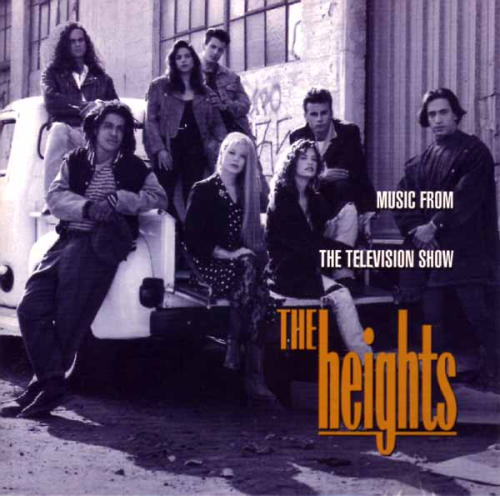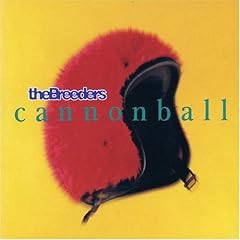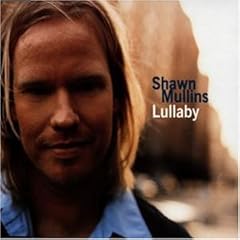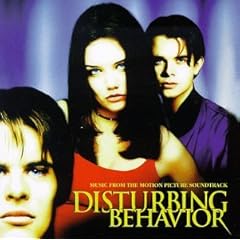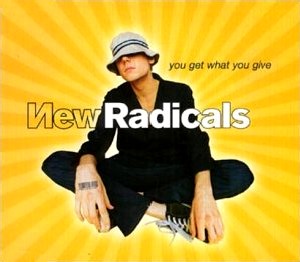 Often times, one-hit wonders come from the soundtrack to a hit movie, whether they be a theme song or just a track off the original motion picture soundtrack. But rarely does a previously released song from an album that came out half a decade earlier shoot to the Top Ten.
Often times, one-hit wonders come from the soundtrack to a hit movie, whether they be a theme song or just a track off the original motion picture soundtrack. But rarely does a previously released song from an album that came out half a decade earlier shoot to the Top Ten.Such is the unusual case of The Proclaimers--the slightly freaky looking Scottish twins duo Craig and Charlie Reid straight out of Auchtermuchty, Fife, Scotland. The brothers formed the band in 1983, getting a big break when they toured with The Housemartins (aka that UK band that Fatboy Slim played bass for). Their first album, 1987's This is the Story featured a successful single with "Letter to America," which reached #3 on the UK charts. The album went gold. Their follow up album, Sunshine on Leith, was another hit and featured three singles in the UK, including "I'm Gonna Be (500
 Miles)," which hit #11.
Miles)," which hit #11.Now here's the interesting part. The band took a six-year break, and during that time became international stars. How?
A small, quirky movie called Benny & Joon starring Aidan Quinn and that guy from 21 Jump Street came along in 1993 and heavily featured "I'm Gonna Be" on its soundtrack, propelling the song to full-blown phenomenon status in the U.S., shooting it to #3 on the Billboards a full five years after its initial release.
The song was unusual, even for a surprise hit--a highly energetic, extremely catchy, post-punk/folk-rock song with the brothers aggressively highlighting their thick accents as they traded off lines and verses. As with so many one-hit wonders, the video--which featured clips from the film featuring Johnny Depp performing humorous, Chaplin-esque physical comedy routines--came in handy. The song soon gained massive airplay on the radio and the success followed in other countries, making the song an international hit and ultimately eclipsing the film it came from.
The Proclaimers were thrust into the spotlight, appearing on late night shows and MTV and
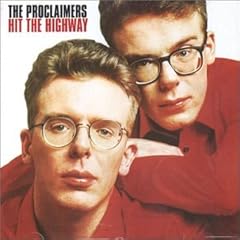 getting spots on other movie soundtracks. Luckily for them, they had just finished their follow up to Sunshine, allowing them to capitalize on the success of the old single. Right? Well, not quite. The follow-up album, Hit the Highway didn't achieve the kind of recognition the brothers might have wanted, most likely overshadowed by the continued success of "Gonna Be." The single "Let's Get Married" offered a similar brand of pro-love (pro-marriage), energetic pop sung by heavy-accented Scotsmen, but it would seem America could only take so much of that sort of thing. The song was a nice, fun ditty, but lacked the simple and immediate rush of their hit. "Gonna Be" felt like a once in a lifetime/impossible to duplicate hit, and lo and behold, it was. The hit was a fluke in the first place, so to expect a long term career in the U.S. was probably barely an option for the duo. And it probably didn't help that Highway's album cover resembled a Wal-Mart family portrait of serial killer twins.
getting spots on other movie soundtracks. Luckily for them, they had just finished their follow up to Sunshine, allowing them to capitalize on the success of the old single. Right? Well, not quite. The follow-up album, Hit the Highway didn't achieve the kind of recognition the brothers might have wanted, most likely overshadowed by the continued success of "Gonna Be." The single "Let's Get Married" offered a similar brand of pro-love (pro-marriage), energetic pop sung by heavy-accented Scotsmen, but it would seem America could only take so much of that sort of thing. The song was a nice, fun ditty, but lacked the simple and immediate rush of their hit. "Gonna Be" felt like a once in a lifetime/impossible to duplicate hit, and lo and behold, it was. The hit was a fluke in the first place, so to expect a long term career in the U.S. was probably barely an option for the duo. And it probably didn't help that Highway's album cover resembled a Wal-Mart family portrait of serial killer twins.After the failure of the album in the U.S., the duo disappeared almost entirely except for in the UK where they continued to chart, though at a far less impressive level than they had in the '80s.
The brothers would wait another seven years before releasing their next album, Persevere, and soon after, began a prolific five years with some independent releases like Born Innocent (2003), Restless Soul (2005), and Life With You (2007).
The band continues to play and tour occasionally. "I'm Gonna Be" continues its ubiquitious nature, popping up in movies and TV shows like How I Met Your Mother. The song was re-released in 2007 as a single and reached #1 in the UK. Naturally, the song is still very popular in their native Scotland where it's played at soccer matches at Hampden Park anytime the home team scores. It's also been covered by at least 15 bands you've never heard of, so you know those guys are making some coin.
I leave you with a nice little blast from the past--an acoustic performance of the song on a show (I assume on the MTV show Alternative Nation) hosted by the one and only frizzy haired, horn-rim glasses wearing Republican VJ, Kennedy.
FIRST SINGLE: A
SECOND SINGLE: B-
Download: The Proclaimers - "I'm Gonna Be (500 Miles)"
Download: The Proclaimers - "Let's Get Married"
And because I love my readers, here's an extra special bonus track from the band's first album that was used to great effect in Wes Anderson's Bottle Rocket:
EXTRA SPECIAL BONUS TRACK: The Proclaimers - "Over and Done With"
Buy Proclaimers Stuff!!
Proclaimers MySpace!!













